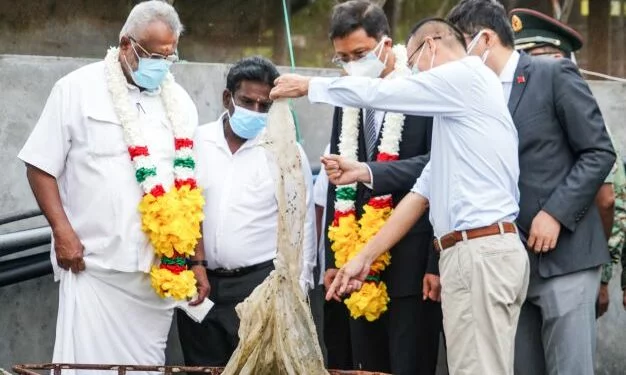Written by P.K.Balachandran
India’s persistent disregard of the woes of the North Sri Lankan Tamil fishermen could have strategic implications for it because rival China is assiduously wooing the North Lankan fishing community with attractive developmental schemes. India considers north Sri Lanka as its strategic backyard and would loathe to see a Chinese presence there.
The North Lankan Tamil fishermen have lost their rights in the narrow sea between Sri Lanka and Tamil Nadu State in India due to heavy poaching by Tamil Nadu fishermen. The latter use trawlers which scrape the bottom of the shallow sea and destroy the nets of the local fishermen. Years of complaining for justice and action to stop the poaching and banned fishing methods have had no effect. Successive Indian governments have been reluctant to rein in Indian fishermen for fear of alienating voters in Tamil Nadu. Fishermen are a strong political constituency in the South Indian State.
Every time the poachers are caught by the Sri Lankan navy, politicians in Tamil Nadu would raise a hue and cry and New Delhi would request Colombo to “treat them humanely” and release them. And Colombo would always oblige because, for it, good relations with New Delhi is more important than serving the interest of the North Tamil fishermen.
The Sri Lankan Tamil parties also do not uphold their fishermen’s cause because politics in the Northern Province is dominated by the Vellalas, a land owning caste and not a seafaring caste. Moreover, the typical North Lankan politician is interested only in securing a federal constitution and not in securing their fishermen’s rights vis-à-vis Tamil Nadu fishermen. Sri Lankan Tamil politicians would not alienate the Tamil Nadu or Indian leaders because their support is needed to pressurize the Sri Lankan government to give autonomy to the Tamils.
Left high and dry, the helpless North Sri Lankan Tamil fishermen sometimes attack the Indian poachers. Recently, two of them were killed in a mid-sea clash. In protest against this, the fishermen of Vadamarchchi East have been demonstrating in the streets since January 30.
However, virtually no support has been forthcoming from the North Tamil politicians. In fact, one of them, Suresh Premachandran of the Eelam Peoples’ Revolutionary Liberation Front (EPRLF) has said that it is not proper for Lankan fishermen to indulge in violence against their Tamil Nadu counterparts. Premachandran and other local politicians use the issue mainly to corner their rival, the Minister of Fisheries, Douglas Devananda. They put the entire responsibility of finding a solution to the problem on Devananda.
But Devananda has been able to do precious little in this matter in the absence of help from either the Sri Lankan government or the Indian government. The only way out for Devananda was to find ways to give the affected fishermen an alternative way of making money. With the Chinese Ambassador in Colombo expressing willingness to help, a sea cucumber breeding center and a fish canning factory were set up. In December last, Chinese Ambassador Qi Zenghong visited these facilities and promised more help for the development of fisheries/aquaculture. He also visited some islands lying on the sea route to Tamil Nadu.
But India sees the Chinese interest in North Sri Lanka as a security threat. Recently, India opposed a Chinese solar power project in three islands off the North Lankan coast on security grounds. Sri Lanka stalled the project though it had been secured by the Chinese company by tendering.
But the stalling of the power project is unlikely to deter China from continuing to make inroads into North Sri Lanka, especially the fisheries sector there. If India cannot stop its fishermen from poaching in Sri Lankan waters (and it cannot for political reasons), then it has to woo the Lankan Tamil fishermen with other development and income generating schemes in collaboration with the Sri Lankan Ministry of Fisheries. If it does not do this, and restricts itself to getting the arrested fishermen released, China will secure a foothold among the fishing community before long, and India will lose a strategic asset to China.
The fishermen’s issue may get further complicated if the leader of the Tamil National Peoples’ Front, Gajendrakumar Ponnambalam, carries out his threat to take it to the UN. Meanwhile, the leader of the Tamil Eelam Liberation Organization (TELO) Selvam Adaikalanathan, has suggested that India help fishermen from Sri Lanka and India take to deep sea fishing, by giving them equipment and training. However, this is unlikely to succeed because one of the Chief Ministers of Tamil Nadu, J.Jayalalthaa, had tried this and failed. The fishermen on both sides of the Palk Strait are traditionally coastal and not deep sea fishermen.


